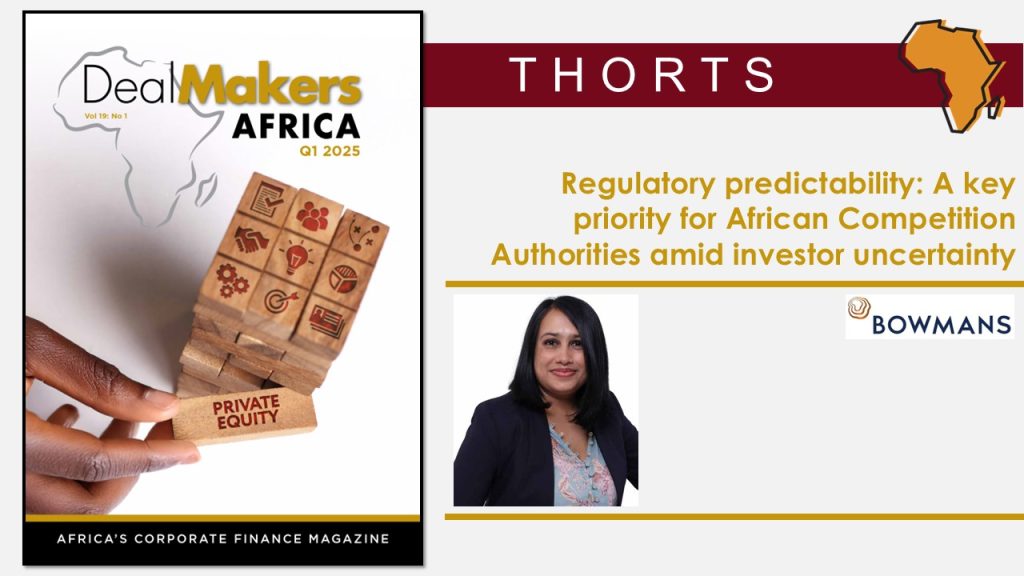In an era marked by geopolitical and economic volatility, the call for legal and regulatory certainty in African markets has never been louder. For investors navigating these markets, particularly in the context of competition law, predictability is paramount. African competition regulators, to their credit, are increasingly cognisant of this need, and are actively working to deliver clear, coherent, predictable and consistent regulatory frameworks.
Heightened complexity
Regulatory unpredictability can take many forms—chief among them, overly complex legal frameworks and insufficient clarity on their interpretation. These can inadvertently lead to regulatory fragmentation, overlapping mandates and, ultimately, a chilling effect on investment and competition.
At last count, 35 African countries had enacted national competition laws, with additional layers emerging at the regional and continental levels. While this expansion reflects growing regulatory maturity, it has also heightened complexity. Key issues include the need for clarity around concurrency of jurisdiction and the harmonisation of enforcement mechanisms and procedural guidelines.
Towards regional one-stop shops
Regional one-stop shops for merger control provide a single, centralised authority for merger review in transactions that span multiple jurisdictions. This gives transacting parties a clear and predictable pathway for notification and approval. Instead of having to navigate a patchwork of differing national laws, filing requirements and merger review timelines, parties can anticipate a uniform process, reducing legal uncertainty and procedural surprises.
In the COMESA Common Market, significant changes are on the horizon, as the COMESA Competition Commission (CCC) intends to adopt revised Competition Regulations, intended to come into effect during the third quarter of 2025. The revised regulations will reaffirm the CCC’s exclusive jurisdiction over mergers with a regional nexus, reinforcing its role as a single point of contact for such filings.
The East African Community Competition Authority (EACCA), while not a new institution, is set to assume a similar role for its member states — Burundi, the DRC, Kenya, Rwanda, Somalia, South Sudan, Uganda and Tanzania. Amendments to the EAC Competition Act and Notices relating to merger control were gazetted in December 2024, introducing yet another regional competition law regime that transacting parties need to navigate.
Notably, the CCC and EACCA share jurisdiction over Burundi, the DRC, Kenya, Rwanda and Uganda. That said, the CCC and EACCA are in discussions to resolve the issue around dual jurisdiction, and to avoid requirements for merging parties to notify in both jurisdictions.
A parallel development is occurring in West Africa. In 2024, the ECOWAS Regional Competition Authority (ERCA) introduced new legal instruments, further clarifying the region’s merger control framework. Under the expanded framework, cross-border mergers that involve at least two member states and meet prescribed financial thresholds are mandatorily notifiable to ERCA. The objective of ERCA is clear: to avoid duplicate filings at the national level, thereby increasing procedural efficiency. The Nigerian Federal Competition and Consumer Protection Commission (FCCPC), however, has indicated that they take an opposite view and still require notification under the national merger control regime. ERCA and the FCCPC are in discussions to resolve the issue around dual jurisdiction. Also to be noted is that a number of ECOWAS member states are also member states of the West African Economic and Monetary Union (WAEMU), where competition law is regulated at a regional level by the WAEMU Commission.
Enhancing legal coherence through collaboration and capacity building
It is widely acknowledged that the development of competition law frameworks across Africa must be rooted in consultation and stakeholder engagement. Legal certainty is best achieved through a participatory process involving regulators, policymakers, the private sector and the legal community.
Moreover, alignment with internationally accepted best practices — whether in merger review standards, investigative procedures, or remedial measures — will enhance coherence and reduce the risk of fragmented enforcement across jurisdictions.
Institutional unpredictability also warrants attention. Economic constraints in some jurisdictions may hamper regulatory capacity, occasionally leading to reactive or inconsistent decisions. Political transitions, too, can disrupt enforcement priorities or redirect focus to other policy imperatives, further complicating the competition regulatory landscape.
Regional regulators are well aware of the structural disparities among member states — be they in the form of varying competition law maturity, resource constraints, linguistic diversity, or differing national priorities.
Strengthening the authority and autonomy of regional bodies in overseeing cross-border mergers represents a constructive step toward reducing this variability.
In COMESA, for example, the CCC has been a key player in building a coherent and effective enforcement ecosystem across the COMESA Common Market. Through strategic collaboration and robust capacity-building programmes, the CCC has significantly advanced the institutional and procedural capabilities of national competition authorities within Member States. In ECOWAS, ERCA intends to do the same. ERCA has designed a curriculum to aid capacity building in Member States and intends soon to roll out training for competition authorities in Member States. ERCA is also in the process of reviewing the laws of Member States with the aim of modifying, updating and harmonising the laws with ECOWAS instruments.
The role of legal practitioners in advancing predictability
The legal profession plays an indispensable role in fostering certainty in competition regimes. Where legislative gaps or ambiguities exist, lawyers can help shape outcomes through constructive dialogue with regulators, the provision of legal opinions and, where necessary, litigation. Judicial pronouncements in precedent-setting cases also serve as catalysts for regulatory reform or prompt reconsideration of administrative decisions.
In summary
Recent regulatory developments across Africa — especially those spearheaded by regional authorities — reflect an encouraging recognition of the critical role predictability plays in attracting and sustaining foreign investment. For legal practitioners, investors and regulators alike, this evolution signals a shared commitment to creating a more stable, transparent and investor-friendly competition law environment on the continent.
Nazeera Mia is a Knowledge Lawyer | Bowmans

This article first appeared in DealMakers AFRICA, the continent’s quarterly M&A publication.
DealMakers AFRICA is a quarterly M&A publication
www.dealmakersafrica.com



